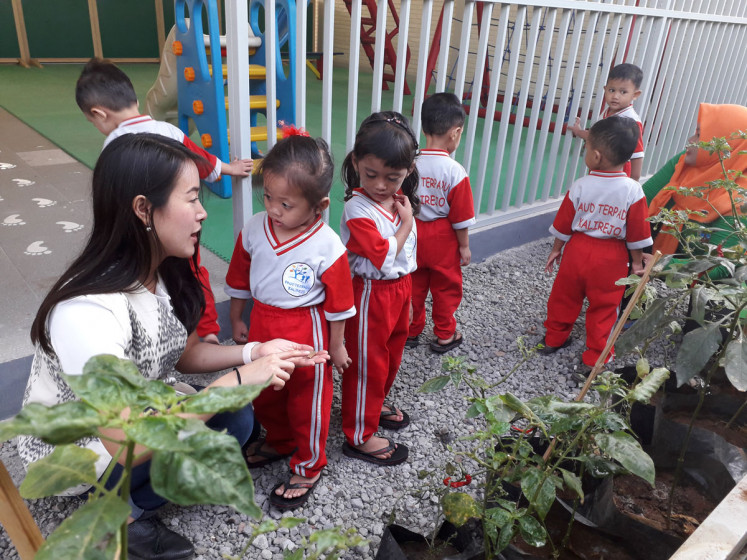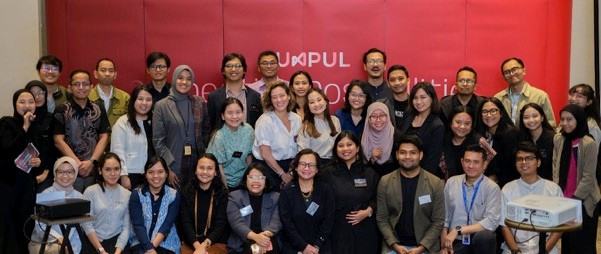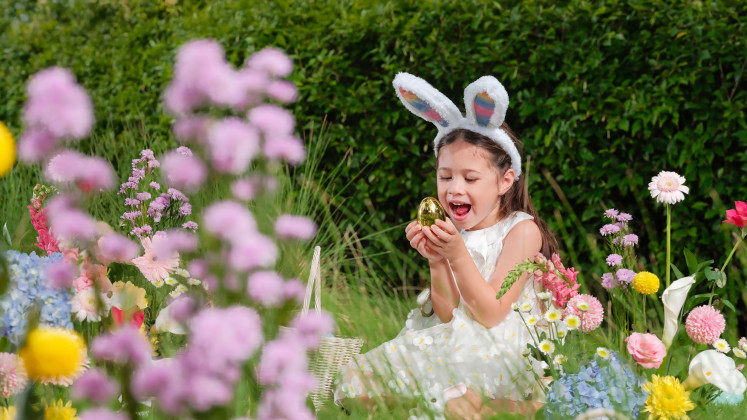Play-based learning prepares youngsters for Industry 4.0 at PAUD Kalirejo
Change text size
Gift Premium Articles
to Anyone
 Children cheerfully climb and down a board as they play and explore a kids' area at PAUD Terpadu Kalirejo. The fun activities help develop and improve the children’s gross motor skills. (Courtesy of Djarum Foundation)
Children cheerfully climb and down a board as they play and explore a kids' area at PAUD Terpadu Kalirejo. The fun activities help develop and improve the children’s gross motor skills. (Courtesy of Djarum Foundation)
I
t was 7:15 a.m. in the morning at the Integrated Early-Childhood Learning Center (PAUD Terpadu) Kalirejo, Undaan district, Kudus regency, Central
Java. Students had already packed the hall although the school only starts at 7:30 a.m.
Following the floor markings in the hall area, the energetic young learners arranged themselves into neat lines in order of their respective class levels. Sometimes this hall is also used to play traditional game bentengan (Enemy Fort), which trains motoric abilities, teamwork and sportsmanship.
As music played from loudspeakers the children and teachers moved their bodies with joy. All showed happy faces.
“Good morning children. Today we will clean our school together,” principal Indarsih told the kids as they were finishing the morning exercise.
After receiving the instructions, the kids dispersed, leaving the hall in groups according to their respective classes, assisted by their teachers. One group was assigned to clean the school’s toilets. Others cleaned the playground, windows, or ditches, or watered the plants.
“Every Friday we have Jumat Bersih [Clean Friday], cleaning up the school together,” Indarsih said, adding that the activity was aimed at habituating the students to care for others and the environment while at the same time learning to work together.
During the activity, the students also learned various vocabularies related to particular objects such as cleaning tools and the danger of ignoring the environment.
Located in the Kalirejo village hall, the school’s building looked different from other buildings in the complex. It has traditional Javanese style roofing built using modern lightweight building materials. A bamboo fence prevents parents from entering the school.
Looking inside, however, one will find a cozy complex with roomy, pastel-colored classrooms for its 103 playgroup and kindergarten students aged between two and six years, built around a large playground placed in the middle of the school compound.
It has almost all the facilities that an early-childhood learning center needs. It even comes with a pantry and dining room for kids as well as a special kitchen for the kids to have cooking classes.
“We indeed helped finance the physical development of the school building here,” Djarum Foundation’s Education Program Manager Felicia Hanitio said during her visit to the school, Friday.
She noted that PAUD Terpadu Kalirejo was one of five PAUD centers in Kudus that had been receiving training and guidance from the foundation since 2017. The PAUD development program was initiated with the goal of helping creating a generation ready to thrive in the future in their jobs and lives in the era of industry 4.0.
Previously the foundation had focused on cultivating workforce readiness among local vocational senior high school graduates and university scholars across the nation.
“But if we want to create a generation that really is ready to compete in the 21st century, starting so at the senior high school or university level is just not enough,” the Singaporean young woman emphasized in fluent Indonesian.
Some technical skills like repairing machine parts or creating good animations, she said, could be learned in three years. Yet, soft skills like resilience and adaptive ways of thinking needed to be developed since the early years.
She shared that the foundation once compared the drawings created by kindergarten, elementary and junior high school students during a selection test for one of their partnering vocational high school’s animation major.
“It turned out that the ones who were the most creative and had the courage to think out of the box were kindergarten students.” said Felicia who is a graduate of Vanderbilt University (Peabody College of Education and Human Development) in Nashville, Tennessee, the United States, majoring in Child Development and Human & Organizational Development.
Observations conducted on senior vocational high school graduates working abroad also gave the foundation almost
the same feedback: Kudus graduates were hardworking and good in technical skills but lacking in key soft skills and character traits such as emotional intelligence, grit, and social problem solving abilities.
Apart from that, she added, there were also multiple international studies revealing that 90 percent of human brain development occurs before the age of fi ve years. Another research revealed that every US$1 invested on early childhood education gave $16 of return on investment for the community.

“Now we have fi nished the two years of intensive training and assistance here. What we do presently is providing them with motivation and moral supports,” Felicia said.
For the two-year assistance program she added, Djarum Foundation cooperated with Jakarta-based PT Kuark Internasional which focused on developing inquiry-based learning. For the program in the fi ve PAUD in Kudus, the inquiry-based learning was designed in the form of a play-based learning. Felicia said the method was deliberately chosen because there had been perception growing among the Indonesian community that the smartest kids were those who could read, write and count well at the young age.
As a result PAUD and kindergarten centers are driven to focus disproportionately on academic skills while neglecting socialemotional skills and other developmental competencies.
There had also been a perception that playing and learning were two different things. In fact both could synergize. Play, she said, was actually the best medium for children to engage and interact hands-on with the world around them with the help of their natural curiosity, while also developing key concepts and skills.
“Here we want to help kids develop a lifelong love of learning and encourage them to ask questions about their environment with the help of their teachers as facilitators,” said Felicia.
She added that doing so would make the kids to see school as a fun and comfortable rather than intimidating place.
For that, she said, the teachers’ and principal’s mindset had to be changed first, from previously rote academic learning into inquiry and play-based learning. They had to understand why they had to change, why students had to learn through playing and whether playing could really achieve learning objectives.
In cooperation with the team from PT Kuark Internasional, the foundation provided the teachers and principals of the five PAUD centers workshops and on-thejob coaching on inquiry and play-based learning, including on how to implement it within the government’s Curriculum 2013 framework.
There they learned about the concept of inquiry-based learning, how to plan teaching and learning activities to implement the concept, and how to develop suitable educative teaching tools. That way, she said, teachers would not be like robots that just follow what was written in the government-made curriculum.
“They will also be able to analyze the needs and conditions in their respective environments for the success of the learning process,” said Felicia who once taught as a volunteer teacher in Phnom Penh with the Children for Change Cambodia nonprofit, an experience that propelled her passion to work in Indonesia’s education sector and help develop PAUD in Kudus through Djarum Foundation.
She considered the foundation was the right institution to channel her desire to share with and help others because it demonstrated a strong commitment to grow a future-ready Indonesia through working at almost all levels of human life cycle, from pregnancy until old age. What the foundation was doing in Kalirejo was just an example of how it had benefited many, including PAUD Terpadu Kalirejo.
A teacher of the school, Sumiyati, said that by implementing the play-based learning method the school could make the students enjoy learning activities much better without making them feel bored or burdened.
Previously, she said, they got easily bored and looked like robots that did things only when they were told to do so. “They could not develop their imagination like they do presently,” Sumiyati said. (JP/Sri Wahyuni)









